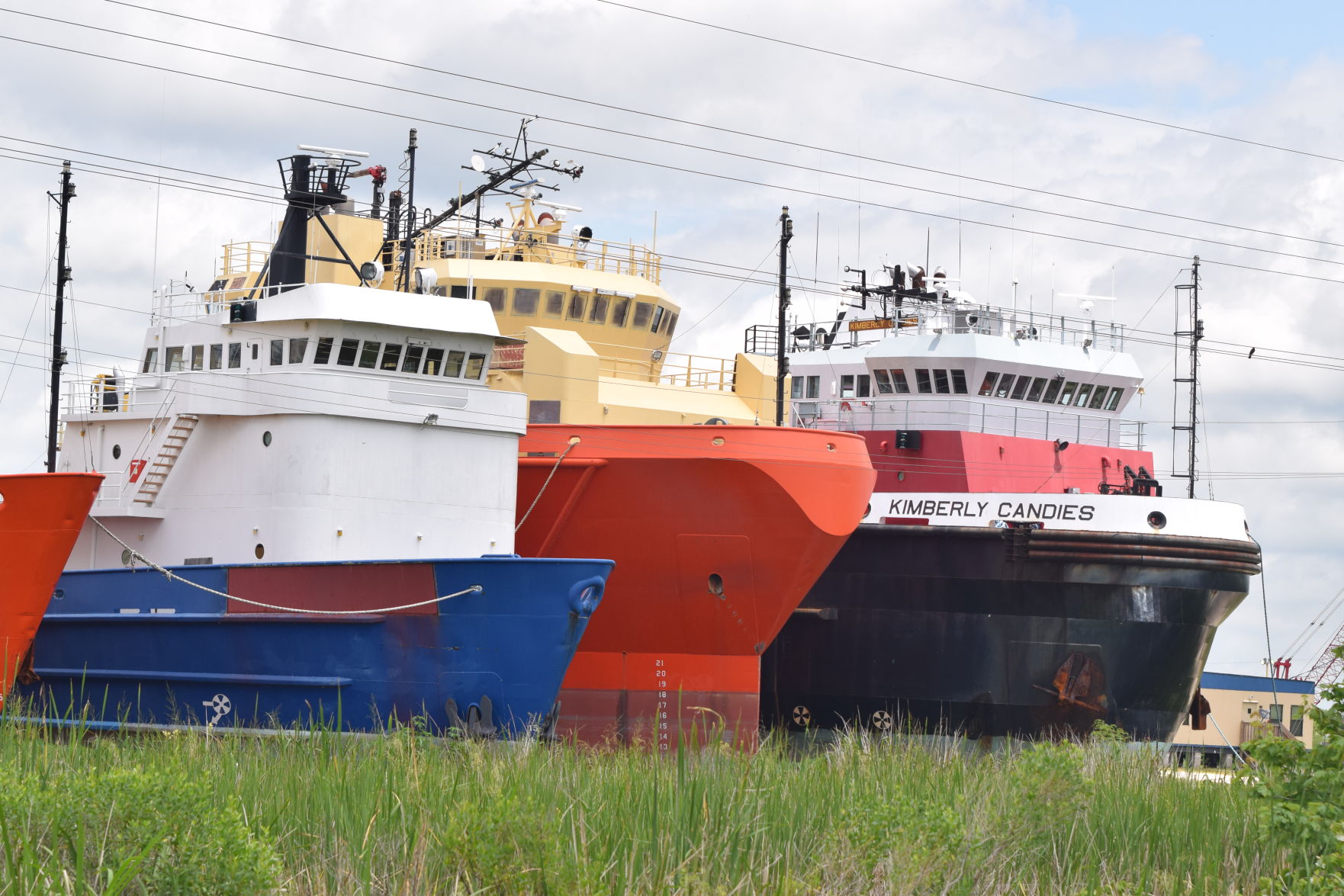Sluggish marine industries need some jolts
May 24, 2016
Bells toll for long-time first responder’s end of watch
May 24, 2016The Bayou Region’s marine industry is fighting to stay afloat as its lifeblood of oil and gas continues to struggle.
Sagging oil prices have led to offshore exploration and extraction companies providing less work opportunities for the supporting vessel companies and reduced pay on what scarce work they can find. While marine businesses grit their teeth through the short-term pain and make tough decisions, they also prepare themselves for a bounce back in the future.
Oil and gas losses ‘shoveled down’
The marine industry, from shipbuilders to those assisting offshore operations, has seen work slow to a trickle as oil companies have cut back on their own work. And when a vessel company does get a job, the payment is at a cut rate.
Economist Loren Scott describes this as the oil industry “shoveling down” their losses onto the lower rungs in the economic ladder. Scott estimated shipping companies have taken at least a 30 percent reduction in payment from oil companies.
“People like BP and Shell went to them and said, ‘Look, guys, we used to get $100 a barrel, now we’re getting $35, or $45 now today. We can’t take a more than 50 percent hit to our revenue stream and be paying you the same amount. You’re going to have to take a hit,’” Scott explained.
That shoveling down does not stop at the marine level, either. Those companies in turn search for savings with their own partners and employees in terms of rate reductions and layoffs.
Two fabrication companies in Houma recently issued Worker Adjustment and Retraining Notifications (WARNs) concerning mass layoffs if they cannot find additional work. Gulf Island LLC said as many as 227 workers could lose their jobs by June 23, while Offshore Specialty Fabricators could lay off 67 workers beginning July 5. In Morgan City, the Danos Marine Contractors’ Fabrication Division issued a WARN saying it expects to lay off about 80 employees between July 13 and July 27, although some will be transferred to other locations.
According to the Louisiana Workforce Commission’s criteria for a mass layoff, the job cuts would amount to at least one-third of each company’s active workforce.
The marine companies have also looked for and received relief from Port Fourchon. The Greater Lafourche Port Commission agreed to reduce rent for all its tenants by 20 percent in April 2015. That reduction, originally scheduled for one year, has been extended through December. Chett Chiasson, executive director of the port, said Fourchon would not raise the rent until the price of oil stays at $60 for a 60-day period.
Marine waiting out oil slump
According to Scott, recovery from the oil slump does not seem just over the horizon, unfortunately.
Saudi Arabia’s increase in production has flooded the market and driven the price of oil down, hampering U.S. shale oil production as intended. The price, at $100 per barrel in September 2014, bottomed out at $28 per barrel at the beginning of this year. It currently sits at $48 per barrel as of press time, but Scott said it is likely an artificial hike due to temporary factors, such as pipeline problems in Nigeria and Iraq and an oil worker strike in Kuwait.
“The problem is that strike’s going to get resolved and those transportation issues are going to get fixed, and that oil is going to come back on the market. Then there’s going to be a weakening of the price,” he said.
Scott said the Saudi’s plan of killing off American production will end up impacting oil prices, as well.
According to Scott, American production peaked at 9.4 million barrels per day in August 2015, and the forecasts he’s seen have the U.S. putting out 8.1 million per day by the end of 2016. That drop in global supply should provide a boost to oil prices. The economist said his current forecasts have oil prices in the $45 per barrel range this year and $55 for 2017.
For a marine industry and regional economy married to the oil and gas sector’s health, the key factor in a recovery will be the Saudis cutting back production to let the price rise. According to Scott, the Middle Eastern country had cash reserves of about $790 billion when it started increasing production. He said his last update six months ago had Saudi Arabia already burning through $100 billion of that.
At the same time, the nation has begun to run a deficit. Scott said Saudi Arabia had a budget surplus of 12 percent greater than its gross domestic product in 2012; that surplus has now shifted to a deficit of 21 percent of the GDP. As a result, the Saudis have cut back public spending by 29 percent, which could cause unrest among the populace, according to Scott.
“So everything’s swinging against them, and everything’s moving in the direction that would say somewhere before long, they’ve got to reverse this. But they’re trying to send a message out and they’re doing a heck of a good job of it,” he said.
As local industry waits out the Saudi price-depressing gambit, it must fight to survive through these lean times. Suzanne Carlos, president of the Houma-Terrebonne Chamber of Commerce, said her organization is conducting a survey among not only member institutions but also all business and industry in the parish it can reach. The survey is to get a temperature of how each is doing and figure out what the chamber can do in assisting them through this bear market.
According to Carlos, the tone her own conversations with business and industry has been one of perseverance.
“The main thing that people have been saying to me is they’re holding on. They’re trying to hold on and weather this out,” she said. “They know it’s going to get better, but they’re not seeing any sign of that yet. But it’s real tough. It’s been really tough.”
Carlos said she has heard talks of layoffs and early retirements for employees, and even companies that have cut pay late last year, only to come back recently and cut again.
“They’re doing everything they can to keep as many people as they can and keep their doors open. But as this goes on longer and longer, this gets tougher and tougher,” Carlos said.
Employees being cut now could mean a talent drain when the market does eventually turn around. SEACOR Marine Vice President Robert Clemons said he has seen job cuts across both the marine industry and oil and gas, and his concern is if the malaise holds steady, laid off workers could leave the offshore sector for good. As those workers turn to other markets, the companies that make it through the slowdown will have to spend big on recruitment when the market returns in strength. However, losing experience and thinning the available talent pool can have wide-reaching effects.
“My big fear is two, three, four years down the road, if this thing lasts that long, we’re going to have a huge hole in the recruitment. We’re going to have to aggressively recruit again, and there’s not going to be a lot of people in the industry, so it could cause some safety concerns,” Clemons said.
Cash is king: Companies look for deals
The industrial downtimes have also become a proving ground for companies’ balance sheets.
According to Scott, many companies working offshore rely on borrowed money to continue their operations. With the recent downturn, some exploration and production companies have not been able to pay back their debts, resulting in bankruptcies. The current market downturn has made banks pull back on lending, and that mentality could linger even when oil’s price rebounds, he said.
“The lenders are going to be really gun shy for a while about lending money. Because they’ve seen how quickly the price can go in the other direction. They’re going to be dicey,” Scott said. “A lot of these folks operate with a lot of leverage. They borrow in order to drill and explore. If they can’t borrow to explore, that’s going to make it a little tough to see a quick rebound in the Gulf.”
At the moment, cash is king. Clemons said his company is riding out the current tempest due to its building up reserves during the offshore bull market.
“It’s a tough market out there these days. Nobody’s immune, no matter how big or how small you are,” he said. “If you maintained some discipline during the good time and maintained some cash reserves, you’re probably going to survive this. And if you didn’t, you’re really going to struggle through this tough climate.”
Gulf Island President and CEO Kirk Meche said his company, though it had to warn of looming layoffs, has been able to hold on so far. He said Gulf Island’s position makes it easier to find work in this climate, as a positive balance sheet puts businesses at ease about the company’s short-term presence.
“We’ve got zero debt, we’ve got cash in the bank, and that’s something not a lot of companies can say. So we’re very fortunate that we’ve been conservative for all these years. And, hopefully, it’ll be enough to weather this market,” Meche said.
Those with strong cash positions are using this opportunity to scoop up assets on the cheap from companies needing an influx of cash. Scott said he spoke with one shipping firm that was looking for deals, trying to buy ships at 20 cents on the dollar. Gulf Island itself purchased local shipyard company LEEVAC and its assets for $20 million at the beginning of this year. According to Scott, this is par for the course.
At Lin-Bar Marine in Bourg, the crew boat fleet is tied up in Bayou Terrebonne, alongside La. Highway 24. Company president Angela Belanger says the hiatus is a strategic decision.
“It didn’t warrant keeping the business operational with so little job offers out there,” Belanger said. “Everybody is fighting to get any market they can get. By parking the vessels, if it does pick up, we can then pick up where we left off. At this time, it is better to shut down,” she said.
One of the Lin-Bar vessels has been offered for sale, Belanger confirms. But there is no intention at this point to jettison the fleet as a whole.
“It’s whoever’s got the strongest cash position. They’re all sniffing around because this isn’t their first rodeo,” the economist said. “They’ve all been through this before. They’re all hopeful the price is going to come up, and they’re watching the Saudis just like everybody else is.” •
No. 1 Local economic slump continues
More than 10,000 jobs have been eliminated at local companies since 2014, state records and other sources indicate, as a slump attributed to low oil prices. The effects have spread beyond oilfield supply companies, and have left stark evidence of hard times on downtown Houma.
The original Samurai Dragon, a popular Japanese restaurant on Main Street went away after 13 years in business. It has since re-opened. Bar Roussell, an upscale bar owned by State Sen. Norby Chabert, also closed its doors.
Despite some other businesses opening in place of those that have folded, the local economy is still slow to recover from a spiral that has yet to end.
Terrebonne tax revenues through July 2016 were down 12 percent compared to revenue through July last year.
A lack of spending due to less overall prosperity and waning consumer confidence has also harmed the local real estate business.
For those local companies and workers directly servicing oil extraction, there is no mistaking the connection between the overall oilfield downturn and local fortunes.
Businesses have forced employees to retire early, laid off employees and some have implemented furloughs, where employees may be paid for only three weeks out of four. Others have reduced workforce through attrition, where those who leave, whether via retirement, layoff or quitting, are not replaced.














